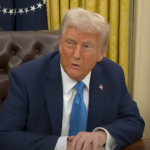President Trump Imposes A Global 25% Tariff On Steel And Aluminum

President Trump on Monday announced 25% tariffs on imports of steel and aluminum to the U.S., reinstating global duties without exceptions for allies such as Canada, Mexico, Japan and South Korea.
These tariffs had been relaxed by the Biden administration. “It’s a big deal. It’s the beginning of making America rich again,” the President said. The two metals are vital components in various industries, including transportation, construction and packaging.
The tariffs will take effect on March 4th. The biggest winner of the trade tariffs is likely to be the US. US steel imports have declined substantially over the past decade, official data shows, falling 35% between 2014 and 2024 — despite a 2.5% annual uptick to 26.2 million metric tons last year.
Many attribute this to tariffs introduced under Trump’s first administration. On Monday, James Campbell, analyst at commodity pricing consultancy CRU, told CNBC that he expected the potential tariffs to have varying effects on the U.S. over time.
“At the start, this could damage demand,” he said. “In the longer term, we can see investment coming through.” In 2024, the U.S. imported steel from 79 countries and aluminum from 89 countries. Those imports had a combined total value of just over $49 billion, according to government data.
Canada and Mexico are among the biggest exporters of steel and aluminum to the United States, so are likely to be hurt by the tariffs if they come into effect — even after being granted temporary respite from blanket duties on all their exports into America.
Germany is also a big steel exporter to the U.S. and is likely to be negatively affected by the tariffs. South Korea, Vietnam and Japan are also among the countries likely to see their metals hit with new import tariffs if Trump goes ahead with the policy.
As we have seen before though, Donald Trump is open to negotiation. So if Germany, Canada, Mexico and Japan want to avoid pain from tariffs, it would behoove them to try to make a deal with Trump as soon as possible.

